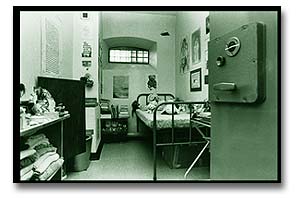"The
purposes of the treatment of persons in custody shall be such as to
sustain their health and self-respect and, so far as the length of sentence
permits, to develop their sense of responsibility and encourage those
attitudes and skills that will assist them to return to society with
the best chance of leading law-abiding and self-supporting lives after
their release." |
Categorisation of prisoners| Prison Conditions | Categorisation of prisonres | Community ties | Support Services | Monitoring prison conditions | John's Story | There is a need for a proper system of prisoner categorisation. Remand and sentenced prisoners are held together. Young offenders are kept in the same institutions as adults. Murderers could be housed alongside shoplifters. None of this is acceptable. Prison regimes must be designed to cater for the differential needs of these vastly different categories of prisoner.
We need to look beyond locks, bolts and bars to the development of relationships between staff and inmates which are based on mutual respect and understanding. Control through good relationships, rather than coercion, should be the goal of all prison managers. The harms of confinement are reduced when family and community ties are maintained. Prisoners and their visitors must have the opportunity to meet in relative privacy in conditions which sustain positive relationships. The visiting facilities in most prisons are noisy and cramped. They require radical redesign and refurbishment so that prisoners can be allowed contact with their visitors. Visits should take place around tables rather than across wide counters. Refreshments and crèche facilities should be available. The visiting arrangements in open prisons (which hold less than 10 per cent of all prisoners) are very good and should be the norm throughout the system. Family links would be easier to preserve if prisoners had better access to telephones. Card phones should be introduced to all prisons by the year 2000. In the interests of promoting contact with the outside community, the routine censorship of prisoners' correspondence should be ended. Letters could still be opened and checked for contraband, but under normal circumstances they should not be read. Mountjoy prison in Dublin is the biggest and busiest Irish penal institution. The quality of primary medical care available there has been the focus of harsh criticism in recent years from the Prison Visiting Committee. Record keeping is inadequate, prison doctors spend little time with their patients, padded cells are overused, and there are concerns about how medication is dispensed. The overall level of psychiatric care is far from adequate. The prison psychology service is massively under-resourced. It is too much to expect six full-time psychologists, all based in Dublin, to cater for the needs of 2,800 prisoners and a similar number of staff. The probation and welfare service is also under-developed in prisons. If rehabilitation is to be taken seriously these services must be upgraded and expanded.
|
||||||
| Calypso
Productions South Great George's Street Dublin 2, Ireland phone (353 1) 6704539 fax (353 1) 6704275 calypso@tinet.ie |
— Welcome
- About - Productions
- Theatre and Social Change - |
||||||
 Many
prisoners are held in conditions which are unnecessarily secure, given
the risk of escape they pose. A greater priority should be given to
matching prisoners to appropriate regimes. The prison chaplains have
criticised the "one size fits all philosophy" which governs Irish prison
management.
Many
prisoners are held in conditions which are unnecessarily secure, given
the risk of escape they pose. A greater priority should be given to
matching prisoners to appropriate regimes. The prison chaplains have
criticised the "one size fits all philosophy" which governs Irish prison
management.